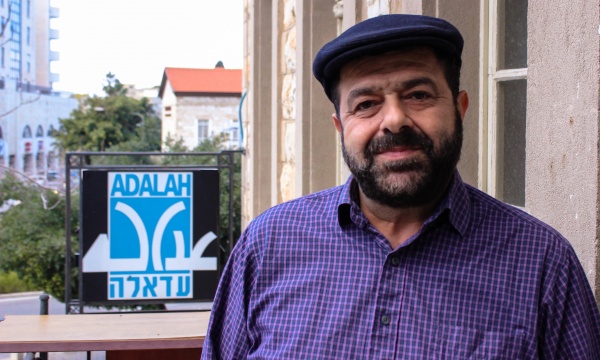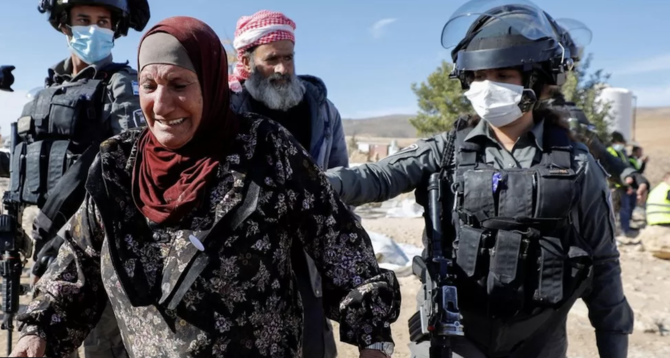LONDON: The Israeli government is taking measures to suppress the Palestinian collective national identity and to prohibit their lawful political expression, experts claimed this week.
One expert, Israeli Arab politician Sami Abu Shehadeh, a former Knesset member, also said the recently elected right-wing government in Israel will have a particular impact on Palestinian citizens, who make up 20 percent of the population within Israel.
He was speaking during a Galilee Foundation panel on Wednesday, which discussed the ramifications the government in Israel would have for Palestinians and their struggle for equality.
Abu Shehadeh said that one of the most dangerous signs of what is to come is the Minister of National Security Itamar Ben-Gvir’s judicial reforms, which include the ordering of Israeli police to remove any Palestinian flags both inside Israel and in the Occupied Territories.
He added: “The state of Israel doesn’t see our national component as a part of our identity.
“They continue reinventing us as a minority, which doesn’t have a national or religious identity, and that is affecting government policies.”
The landslide victory of Israel’s extremist right-wing parties in December sounded alarm bells throughout Israel and for its historic Western allies, he said.
Abu Shehadeh also said Palestinians can expect discrimination in the education sector as a result of the new government’s stance.
He added: “Most of the world is unaware that the Israeli education system, like the rest of its society, is built on racial separation.”
There are three different official education systems in the country: for Palestinians, for Jewish secular groups, and one for Jewish religious groups.
While all school systems include lessons in modern Zionist history, Palestinians are prohibited from studying their own history, with Israeli Minister of Education Yifat Shasha-Biton once describing it as “dangerous incitement” against the Israeli government and army.
The experts speaking on the panel argued that the fundamental policies of the new coalition government were intended to target Palestinians, and they were not receiving the attention of the international community nor attracting public debate in the country.
They argued the focus had instead shifted toward the new government’s plans for judicial reform, which they said threatened Israeli democracy.
“While the legal reforms are important, the extreme Israeli audience is not waiting for these laws to pass,” Abu Shehadeh said.
Dr. Areen Hawari, director of the gender studies program at the Mada Al-Carmel Arab Center for Applied Social Research in Haifa, shared her thoughts on the matter.
She said: “Israel is a settler colonial state, the homeland of other people, just like South Africa, New Zealand, and Australia.
“Such colonial states, but particularly Israel, which was established in 1948 after World War II, need strongly as part of their existence to belong to the West.
“In order to be part of the West, you need to introduce that at least you are procedurally democratic.
“That is why the left wing in Israel is ready to fight against these new reforms because if you lose the support of the West, you lose your existence.”
However, Hawari said that, for the first time, the new government “simply doesn't care” about what the West thinks of them.
She claimed this was due to the success of its ongoing occupation, the recent normalization agreements with several Arab countries, the country’s gains during the Trump administration, and the continued silence of the EU.
Dr. Hassan Jabareen, a Palestinian human rights lawyer, acknowledged that among the thousands of Israelis protesting in Tel Aviv against the new judicial reforms, several have criticized the country’s treatment of Palestinians.

Dr. Hassan Jabareen. (Supplied/Galilee Foundation)
Equally, he said: “We cannot find ourselves protesting in Tel Aviv in saving Israeli democracy when we do not see Israel as a democratic state. We see ourselves as victims of that very legal system.
“So while it's very difficult for Palestinians to participate in the protest, we agree with some protester leaders that we are in fact the main victims of Israel’s new government.”
As the growing threat of Israel’s extremism looms, Abu Shehadeh told Arab News that Palestinians, especially those settled around the world, need to rethink the way they strategize for their liberation.
He said: “One of our challenges is that we, as Palestinians, are talking to ourselves and people who are similar to us.
“For us activists, everything that is going on [in Palestine] is taken for granted, but a lot of the world doesn’t know the basics.”
He claims activists must continue to educate others who do not know about the Palestinian cause, question, and narrative.
“It is important for the world to see that we are struggling against not a democracy according to its false image. To call it apartheid is not enough… I think this is the most racist society, “ he said.
“People should see this truth in order to support our struggle. We are struggling for peace, justice, and equality for all, both Palestinians and Jews.”




























